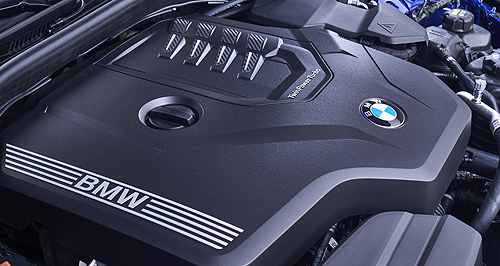News - BMWParis show: BMW commits to mild hybrids across rangeIC view: BMW AG board member for development Klaus Froehlich says he could “never” see a time when an EV could cost the same as an equivalent IC-engined car. All future BMW internal combustion engines to include 48-volt hybrid system by 20253 Oct 2018 By TIM NICHOLSON in PARIS BMW has revealed that all of its internal combustion engines (ICEs) will be paired with a 48-volt mild hybrid system by 2025.
While Audi and Mercedes-Benz are already offering their own mild hybrid systems across various model lines – integrating a compact electric motor/generator with the conventional powertrain – BMW plans to have its own system in production next year ahead of a new-generation version due around 2022.
Speaking to Australian journalists at the Paris motor show this week, BMW AG board member for development Klaus Froehlich said the company was still developing ICE technology and highlighted the progress of the company’s 48-volt on-board electrical systems.
“On emissions (for ICEs), it is going very close to zero emissions or something,” he said. “On fuel consumption, I am happy if I do not worsen the fuel consumption of the combustion engine.
“That is the reason why all combustion engines by 2025 need 48 volts or something for fuel consumption. That is the reason why I am not investing too much in the first generation that is belt-driven alternator, 8-10kW. Of course they do not offer a lot of functionality.
“So I am working on the second generation. I see it beyond 2022. I am working on it. They will have bigger battery of 48-volt. They will include the e-motor in the transmission. And they will generate more than 20kW.
“And of course because they have the transmission, I can cut of the engine with a clutch or something like that.”
Mr Froehlich added that the gains from the new technology would result in a 10-15 per cent improvement in fuel consumption.
He said while the company was investing heavily in electrified powertrain technology, customers were taking a while to warm to electric vehicles.
“I think others will not invest so heavily in fuel consumption reductions. But honestly, if you look at the CO2 regulations worldwide, there is an ambition to have a high percentage of battery electric vehicles,” he said.
“The only problem is, we do not find enough customers who want to drive electric vehicles and face all of the constraints that are a result of it. I am investing heavily in ICEs for the 48-volt. And especially for Europe – less a topic for Australia – I will work heavily on the plug-in hybrids, which will have a range of up to 100km.
“So next year we will launch – because nothing else is available – first-generation 48-volt systems, which bring a six-to-10 per cent fuel consumption reduction. As soon as the transmission is available we will switch to that (second generation).”
Meanwhile, Mr Froehlich said he could “never” see a time in the medium term where the cost of an electric vehicle would be the same as an equivalent ICE-powered car, because of the cost of producing the battery technology.
“If you read in the press that if you have full-scale 1kWh of battery capacity, it will cost you between €100 and €150 ($A160-$240). This means if you (have) these cars with 90-100kWh, the cell cost will be €10,000 to €15,000 ($A16,000-$24,000). You can produce whole (ICE) cars only with the cost of the battery.
“And you do not have economies of scale, when everybody wants to have cobalt, the prices of cobalt will not go down, they will go up. This is the reason we have this long-term project to get low prices for cobalt also in 2030. We are the only ones who are doing that.”
BMW confirmed earlier this year that it was planning to secure a 10-year supply of cobalt and lithium for batteries used in its electrified vehicles.
For now, cobalt and lithium are required for the production of high-density lithium-ion battery cells and if there is no alternative found in the coming years, demand is expected to soar on the back of the increase in global EV production.
Mr Froehlich said it was unlikely “that an electrified vehicle will cost the same as a combustion engine car”, adding that too much fast charging of an EV could have a negative impact on batteries.
“You have to change your attitude if you are driving a battery electric vehicle,” he said.  |
Click to shareMotor industry news |














Facebook Twitter Instagram